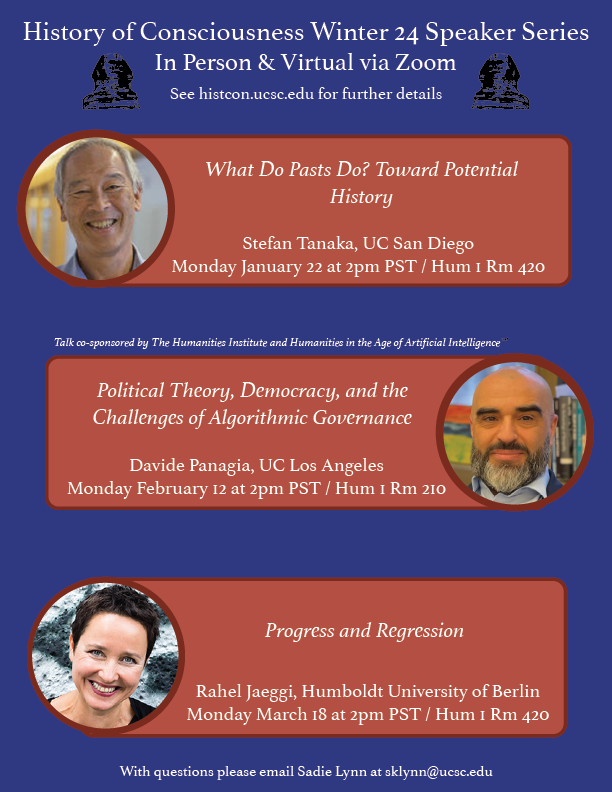
Attend in-person (masks strongly recommended) or virtually via Zoom. Visit the Speaker Series Home for Zoom links.
Events:
What Do Pasts Do? Toward Potential History with Stefan Tanaka, UC San Diego
Monday January 22 at 2pm PST
This talk builds from recent work on time and history that question whether the history understood and practiced over the past two centuries is still apposite for understanding our world today. An increasing number of writings argue that "time is out of joint," we are "fatally confused," in "times of unprecedented change," or more troubling, "in times of collapse." My subtitle--drawing from Ariella Azoulay's book--points to the need for other modes of historical understanding. In this essay, I question a foundational ideas of modern history, the separation of past from present, and argue for pasts rather than "the past." With this rather simple (but difficult) distinction time and space shift from absolutes within which we exist to modes by which we think; other histories become possible. My goal is to explore what history (and histories) might become, the potential of history released from the restrictions of chronology. Multiple pasts recognize variability, situatedness, and perspectives; history expands (or returns) to a mode of communication; and pasts require greater articulation of purpose and awareness of responsibility.
Stefan Tanaka is Professor Emeritus of Communication at the University of California, San Diego. Throughout his career he has inquired into the uses of pasts and time in the writing of history, especially in Japan. Japan's Orient: Rendering Pasts into History (1993), examines the reconfiguration of Japan's past as foundational to the redefinition of Japan's relations with Asia during the early twentieth century. New Times in Modern Japan (2004) is an examination of the social constitution of time in Meiji (1868-1912) Japan. His current research examines the challenge that our digital age presents for history itself. This activity ranges from the philosophical to the practical. His recent book, History without Chronology (2019, Open Access), brings out the historicity of the linear and homogenizing structure of history itself. He has also written several essays on historical narrative and digital media (for example, "The Old and New of Digital History" 2022) and worked (especially with the Force11 community) to foster new, more open modes of scholarly communication.
Political Theory, Democracy, and the Challenges of Algorithmic Governance with Davide Panagia, UC Los Angeles
Monday February 12 at 2pm PST
* Note: this event will take place in Hum 1 Rm 210 *
Talk co-sponsored by The Humanities Institue with Humanities in the Age of Artificial Intelligence
In this talk I will raise some challenges that political theorists face when reflecting on the political import of algorithmic governance. I do not develop normative or epistemic insights into these challenges, and in fact suggest that such an approach is problematic. Rather, I proceed by articulating some aspects of the political ontology of algorithms that, I suggest, are decidedly different from our more conventional intuitions (classically derived from Aristotle) on what a medium is and how it operates. I then proceed to suggest that the biggest challenge raised to political and democratic thought by algorithmic governance regards a critical theory adequate to the claims of the medium. On this last point, I attempt to reconstruct what I believe are the basic conceptual elements that need to be considered in a political theory of algorithms.
Davide Panagia is a political theorist and Professor and Chair of Political Science at UCLA. He is a former Co-Editor of the journals Political Theory and Theory and Event. His forthcoming monograph publications include: Intermedialities: Political Theory and Cinematic Experience (Northwestern University Press, 2024) and Sentimental Empiricism: Politics, Philosophy, and Criticism in Postwar France (Fordham University Press, 2024).
Progress and Regression with Rahel Jaeggi, Humboldt University of Berlin
Monday March 18 at 2pm PST
